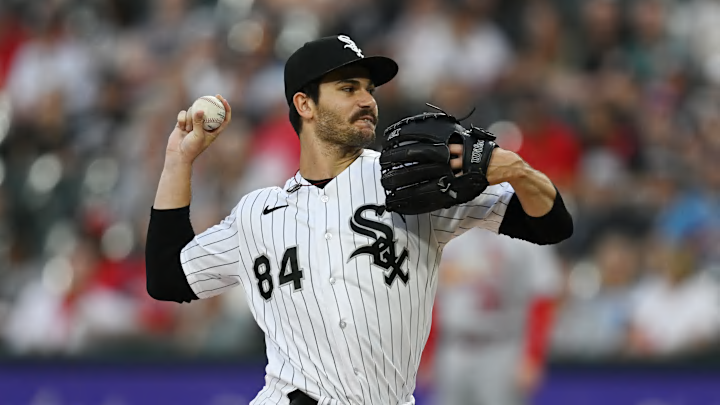Number one starter: Dylan Cease
Let me start by saying, I would love it if the Cardinals signed Yoshinobu Yamamoto, but when I think of the best possible rotation they can build, going this route made too much sense.
Dylan Cease will be 28 before the 2024 season and is coming off a down year, but he still has some of the best stuff in baseball and was second in Cy Young voting just one year ago. He is set to make about $8.8 million this year in arbitration and then has one more year of team control left in 2025.
Cease eats innings. He threw 165.2 innings in his first full season in 2021, 184 innings in his elite 2022 performance, and 177 innings in 2023. He also has the strikeout stuff the Cardinals need badly, and will not cost as much as a Logan Gilbert would in the trade market.
In this scenario, I have the Cardinals acquiring Dylan Cease from the White Sox for UTL Tommy Edman, RHP Tink Hence, and OF Chase Davis
That's a lot to give up, I understand that. The Cardinals hold onto their best young infield bats in Nolan Gorman and Brendan Donovan, don't have to give up top prospects on the cusp of their MLB debuts in Thomas Saggese and Victor Scott II, and still hold onto pitching prospects like Tekoah Roby, Gordon Graceffo, and Cooper Hjerpe. But you've got to give up value to get value, so they lose their number two and number three prospects along with Tommy Edman. I came up with five other Dylan Cease trade packages last week as well that could work instead.
In this dream scenario, the Cardinals now go into 2024 with a rotation of...
1. Dylan Cease
2. Tyler Glasnow
3. Sonny Gray
4. Miles Mikolas
5. Steven Matz
They do all of this while holding onto all of their core position players and the ones set to make an impact soon, and still have around $18 million to spend to add a few relievers or replenish the bench with a veteran position player.
Something else I like about this scenario is it keeps the Cardinals' options open in 2025, 2026, and 2027 as well. Glasnow becomes a free agent after 2024, Cease after 2025, and Gray after 2026. If the Cardinals need to make a major move following each of these seasons, they have money coming off the books. They are not now locked into two or three long-term commitments here, but if things go well with either or both of Glasnow and Cease, they could offer extensions.
On the note about how much capital the Cardinals had to give up in these two trades, losing Tink Hence, Alec Burleson, Tommy Edman, Chase Davis, and Sem Robberse hurts, but the Cardinals have a unique opportunity to replenish their system this next summer with their projected top-5 pick in the MLB draft and selecting in the top-6 in every round following. Sure, they lose their second-round pick with the Gray signing, but they can add significant talent in the other rounds to rebuild this system.
If they do not end up resigning Glasnow and/or Cease, they can get draft picks in return for them as well through qualifying offers, so I'm really not all that concerned here with the talent heading out.
What do you think of this dream rotation for the Cardinals? Let me know on Twitter/X (@joshjacoMLB).
